基于单片机太阳能充电系统的设计
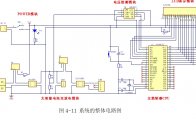
基于单片机太阳能充电系统的设计(任务书,开题报告,外文翻译,论文12000字)
摘 要
本文的主体是对一个基于单片机控制的太阳能充电系统的设计与开发,该系统比传统充电器更加显得节能与环保。同时手机在阳光充足的情况下即可通过该太阳能充电器来进行充电,而不是一味地依赖市电。该太阳能充电器设计的来源是将太阳能转换为可供手机等电子设备充电的电能,主要解决的技术问题也是如何将太阳能转换为电能。
该基于单片机的太阳能充电系统的设计内容主要是对单片机最小系统、ADC0832转换模块、太阳能充电电路、太阳能充电电池、电源模块以及液晶显示模块等模块进行分别设计,最终再将它们组合成一个完整的太阳能手机充电系统,使得太阳能电池板能够在获得太阳光的照耀下,电路导通,从而使手机等电子设备里的锂电池完成充电。
本文设计的太阳能充电器具有低成本,易实现,操作简单,可靠性较高,易于制作和生产等优点,可以良好地对手机进行充电。
关键词:单片机;ADC0832;太阳能充电器; 锂电池
Abstract
The main body of this paper is the design and development of a solar charging system based on MCU control, which is more energy-saving and environmentally friendly than traditional chargers. At the same time, the mobile phone can be charged by the solar charger in the sunny condition, instead of relying solely on the municipal electricity. The design source of the solar charger is to convert solar energy into electricity for charging electronic devices such as mobile phones. The main technical problem to be solved is how to convert solar energy into electricity. [来源:http://www.doc163.com]
The design of the solar charging system based on single-chip computer mainly includes the minimum system of single-chip computer, ADC0832 conversion module, solar charging circuit, solar charging battery, power module and LCD module. Finally, they are combined into a complete solar cell phone charging system, so that solar panels can get solar light. Under the illumination, the circuit is turned on, so that the lithium batteries in mobile phones and other electronic devices can be charged.
The solar charger designed in this paper has the advantages of low cost, easy realization, simple operation, high reliability, easy manufacture and production, etc. It can charge the mobile phone well.
Key Words: microcontroller; ADC0832; solar charger; lithium battery
[版权所有:http://DOC163.com]
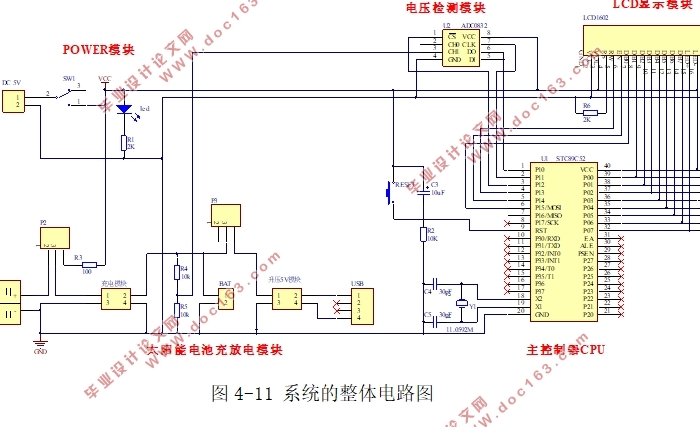
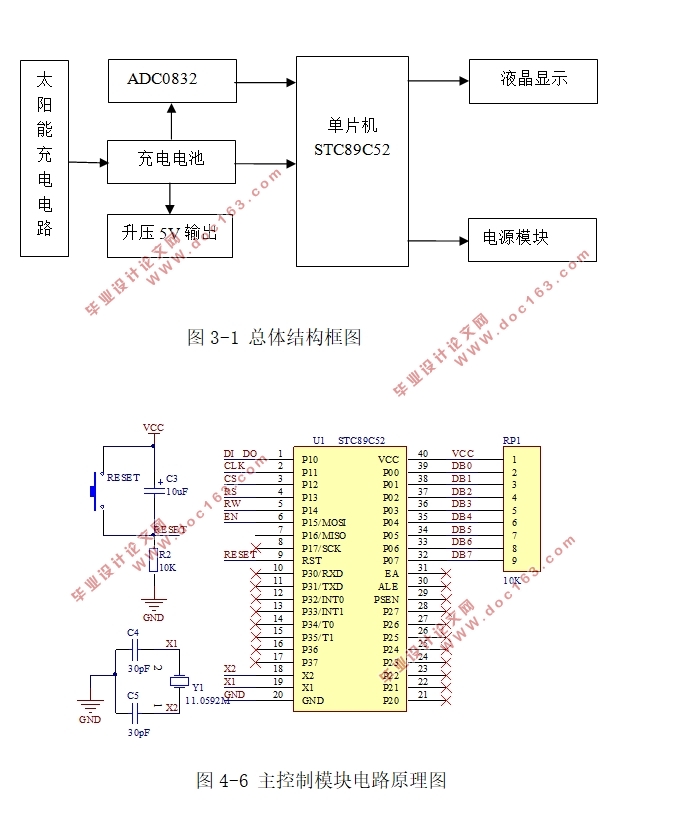
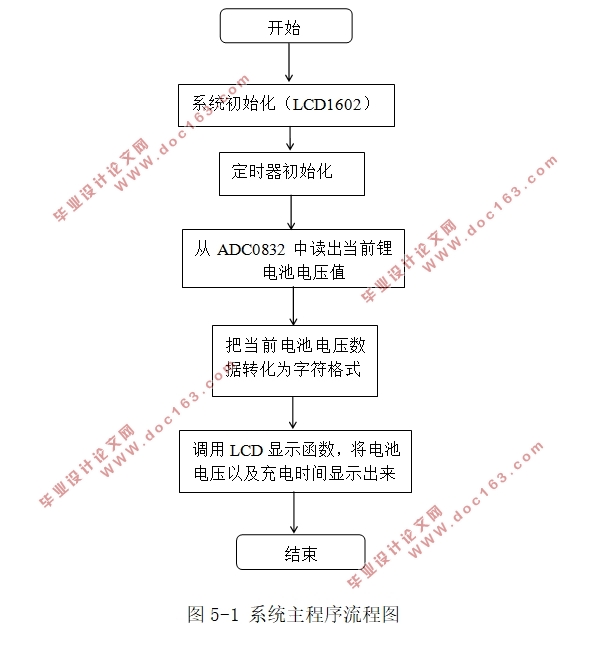
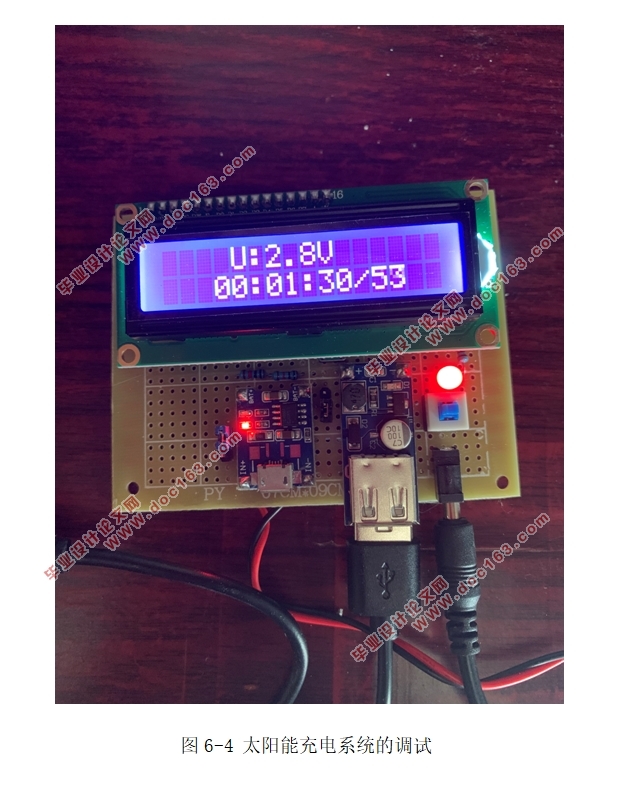
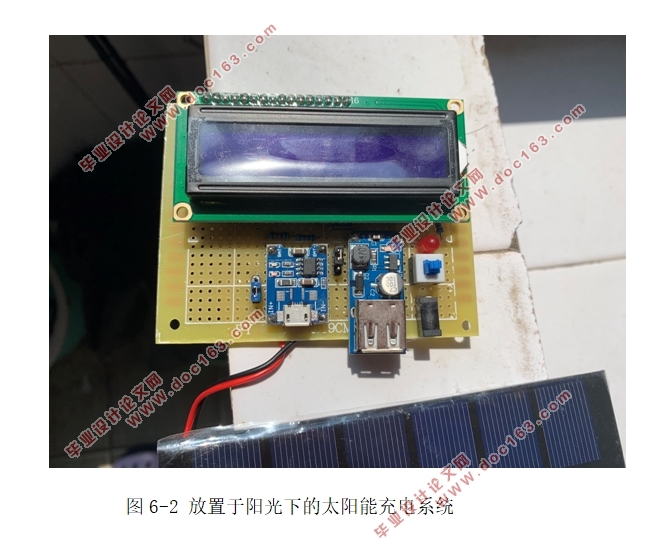
[资料来源:http://doc163.com]
目 录
第1章 绪论 1
1.1 选题背景及意义 1
1.2 国内外发展状况 1
第2章 太阳能电池板简介 3
2.1太阳能电池板的材料与分类 3
2.2 太阳能电池板的工作原理 3
第3章 总体方案设计 5
3.1 总体设计方案 5
3.2 主控制器模块的选取 6
3.3 太阳能电池板模块的选取 6
3.4 转换模块的选取 6
3.5 电源模块的选取 6
3.6 液晶显示模块的选取 7
第4章 系统硬件模块的介绍与设计 8
4.1 芯片资料简介 8
4.1.1 单片机STC89C52 8
4.1.2 模数转换器ADC0832 10
4.1.3 液晶显示模块LCD1602 11
4.2 充电系统的硬件实现及各个单元电路 12
4.2.1 单元电路设计之主控制模块电路 12
4.2.2 单元电路设计之太阳能充电模块电路 13
4.2.3 单元电路设计之充电电压AD采集电路 14
4.2.4 单元电路设计之显示模块 15
4.2.5 单元电路设计之电源模块 16
4.3 充电系统的整体电路图 16
第5章 系统软件模块的介绍与设计 18
5.1 系统软件运行平台 18
5.1.1 Proteus仿真软件 18
5.1.2 PROTEL画图软件 18
5.1.3 Keil软件 18
5.2 系统软件设计 18
5.2.1 程序结构分析 18
5.2.2 系统程序流程图 19
5.2.3 锂电池电压采集程序流程图 20
第6章 充电系统的安装与调试 21
6.1 充电系统的安装 21
6.1.1 检查元器件的好坏 21
6.1.2 焊接各元器件 21
6.2 充电系统的调试 22
第7章 总结与展望 26 [资料来源:http://doc163.com]
7.1 总结 25
7.2 展望 25
参考文献 26
附录:部分源程序 27
致 谢 29 [来源:http://Doc163.com]
